More from 2point6billion: While India has imposed restrictions on Chinese toys and the import ofsome types of steel, Vietnam has increased import tariffs on dairy andpaper products. Similarly, the Indonesian and Malaysian governments arepublicly prompting their people and ministers in specific to buylocally produced food, drinks, shoes, clothes, music and films or facepenalties. In China, farmers in certain provinces are being given a 13percent subsidy if they buy locally made refrigerators, televisions,mobile phones and washing machines. While construction companiesproducing publicly funded infrastructure projects in other parts ofChina are being encouraged to use locally produced steel, concrete,doors and windows, glass, wiring […]
Asia-Pacific Archive
Free Newsletter
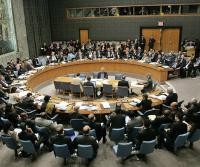
TOKYO — Japan made it known that it hoped to take advantage of any momentum in reforming the U.N Security Council to secure a seat as a permanent member. The renewed attention to the issue comes in the wake of an announcement by U.N. General Assembly President Miguel d’Escoto Brockmann last month that he planned to press forward with reform of the Security Council. Although currently a rotating member until the end of 2010, permanent status has proved elusive for Tokyo. The Japanese government felt it was on to a winning formula during the last major round of reform discussions […]
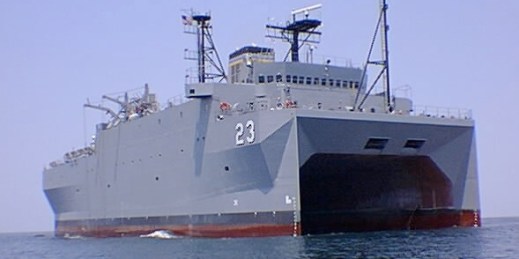
The news coverage of the recent U.S.-China incident at sea is tendingtowards a reductionist take: portraying Chinese behavior mostly as an attemptto test the Obama administration. But the incident has more to do with a longstanding strategic chess match in the South China Sea that goes back at least to the 1990s, and that is unlikely to be resolved anytime soon. If the USNS Impeccable was loitering off the coast of Hainan, it was not by coincidence. The island is home to a Chinese naval base where a new class of nuclear-powered attack submarines is now stationed, providing easier access […]
Joshua Foust decided to parse my use of literary criticism to deconstruct Afghan roads as an element of COIN strategy, and the result isn’t pretty: Here, though, Grunstein’s argument falls apart. There is preciouslittle evidence that a) “Afghans” have a homogenous identity; b) thecurrent “intrusion” by the outside world is any more significant orjarring than it was before 1979; or c) they actually dislike roads. Infact, of all the people I’ve spoken to the last two months—Pashtuns, noless—they want more, rather than fewer, roads. They see roads as the key to prosperity—a simplistic view, perhaps, but no less heartfelt. In […]
Perhaps a more revealing indicator of protectionist sentiment than actual trade barriers are the barriers to labor that are springing up in Asia, as reported by 2point6billion. Trade restrictions are still stigmatized, due to the reflexive habits of the past ten years of globalization, and so we can expect them to lag behind popular and political sentiment that might support them. Restrictions on labor’s freedom of movement, on the other hand, are pretty widely accepted as being up to each individual state to decide for themselves. And they seem to be spreading pretty quickly, both as state policy (cancelled work […]
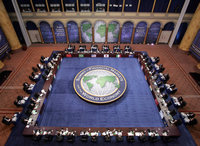
When finance ministers of the Group of Twenty nations come together on Friday to prepare for the upcoming G-20 summit, observers, journalists and analysts will no doubt focus on disagreements among the members over how to tackle the ongoing world economic crisis. After all, differing views on the best course of action have already stolen the headlines. To be sure, points of contention do exist and they could make for a tense meeting at West Sussex this weekend, as finance ministers struggle to come up with a productive and forceful agenda at the April summit in London. And yet, the […]
Regarding yesterday’s post on Afghan roads, Joshua Foust pointed me in the direction of his Columbia Journalism Review article on the life and death of the “road-building” meme, which appeared last September. It focuses on the fallacy of equating road-building with security, but triggered an additional thought for me about the COIN emphasis on narrative. I’ve already written about the tension that can arise when a narrative meant for domestic consumption plays poorly in-theater, and vice versa. But the road-building meme Foust dissects illustrates the way in which COIN practitioners will inevitably tend to interpret the narrative they’re constructing in-theater […]
This was my intuitive reaction after reading this Matthew Yglesias post: So without a recovery in the U.S. and global economy, there cannot be asustainable recovery of Chinese growth. And with the U.S, recoveryrequiring lower consumption, higher private savings and lower tradedeficits, a U.S. recovery requires China’s and other surplus countries'(Japan, Germany, etc.) growth to depend more on domestic demand andless on net exports. But domestic-demand growth is anemic in surpluscountries for cyclical and structural reasons. So a recovery of theglobal economy cannot occur without a rapid and orderly adjustment ofglobal current account imbalances. But I’m not Nouriel Roubini,so I […]
Remember that slew of articles not too long ago all about how building roads was an essential element of counterinsurgency in Afghanistan, because in addition to providing better access for securing the population, roads also helped integrate farflung villages into the broader economy? That’s how COIN practitioners see roads anyhow. Here’s John McCreary on how Afghans see them: . . . Roads are a mixed blessing because they improve the efficiency of the taxation system as well as expand the market area. They also can be infrastructure for village improvement, but that is not the expected customary result. Roads usually […]
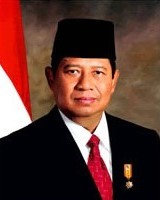
Secretary of State Hillary Clinton’s recent visit to Jakarta underscores the importance that the Obama administration appears to attach to Asia and to the U.S. relationship with Indonesia. Indeed, a broad-based, mutually beneficial partnership between the United States and Indonesia can and should be one of the foundations of America’s 21st century Asia-Pacific strategy. But in shaping America’s future relationship with that key country, U.S. policymakers should avoid the miscalculations that previously anchored the United States’ engagement to Indonesia’s anti-democratic, military-dominated elites. Throughout the Suharto dictatorship and even after his fall, U.S. relations with Indonesia suffered from inadequate attention to […]
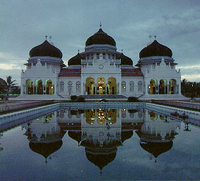
DENPASAR, Indonesia — Not very long ago, many observers considered Aceh, Indonesia’s formerly war-torn separatist province, a success story. But a recent rise in political violence has led Indonesian President Susilo Bambang Yudhoyono and Aceh Governor Yusuf Irwandi to warn against potential spoilers of Aceh’s peace process. Nobel Peace Prize laureate Martti Ahtisaari, who brokered the 2005 deal between the former secessionist Free Aceh Movement (GAM) and Jakarta, has also emphasized that a long-term resolution is far from ensured. Tucked in the westernmost corner of the Indonesian archipelago, Aceh’s conflict ended in the aftermath of the December 2004 tsunami that […]
Last week I mentioned that COIN offers a vision of war that is more intellectually satisfying and morally palatable. Today over at Small Wars Journal (.pdf), Jason Fritz takes that a step further and calls it more aethsetically pleasing — to its proponents. It’s an interesting framing of the COIN vs. Conventional debate, where the zealots on either extreme of the spectrum are actually blinded by the beauty of their ideal method of warfare. Here’s Fritz: . . . Multi-agency counterinsurgency doctrine provides a holistic governmentsolution for socio-political-economic problems. It is government at itsbest — various agencies working together to […]
It seems like all roads lead to China here on the blog, at least yesterday and today. But among the seven points raised by Karl Inderfurth in Congressional testimony on U.S.-India relations, this one really warrants emphasizing: Sixth, promote a cooperative triangle. Along with themuch-improved U.S. -India relationship has come questions about theunderlying motivations for this new direction in American foreignpolicy, specifically whether it represents a hedge by Washingtonagainst a rising China, India’s most consequential neighbor. Thesemanipulative temptations should be resisted. Strengthened U.S. tieswith India have their own strategic logic and imperatives and shouldnot be part of a China containment […]
The oddest thing about recent discussions of the “regional approach” to Afghanistan is that it systematically ignores the pink elephant in the room: China. So we hear about Af-Pak, with India referred to by its given name out of deference. But if you talk about Pakistan and India without talking about China, you’re leaving out a big part of the equation. To see why, check out the feature issue WPR ran on the region titled, The Asian Triangle, but especially the Arif Rafiq piece, Pakistan’s Search for Security (subscription required.) It just so happens that Chinese interests on Afghanistan and […]
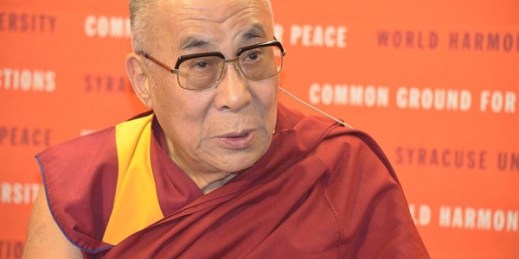
Fifty years after their failed uprising against Chinese rule, Tibetans, from Lhasa to London, are seething. As a show of resolve, monks, merchants, and expats vowed not to celebrate Losar — the joyous Tibetan New Year festival — this year, choosing instead to mourn those who died in violent clashes in Tibet last March. Protests in China, meanwhile, continue to be marred by self-immolations, with a monk setting himself ablaze in protest last month. In a statement issued Feb. 25, Tibetans' spiritual leader, the Dalai Lama, acknowledged their frustration, but urged patience and restraint. "It is difficult to achieve a […]
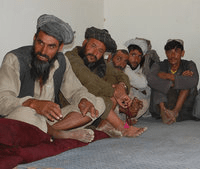
KAPISA PROVINCE, Afghanistan — Over scalding cups of tea in mid-February, an elder in Nijrab, Afghanistan said to me, “For two years you have come here and asked me the same questions. I like you, I like the French, but you people never learn.” He was referring to the generic questions Westerners ask Afghans: What is your life like? Where is the Taliban? What are your village’s needs? This particular elder has regular contact with American troops, and likes Americans enough to have tea with us. Nevertheless, he was deeply frustrated by the way, for all our questions, we never […]
Another sector that should be significantly impacted by theglobal economic downturn is the international arms market, where tighter budgets will favorreverse-engineered knockoffs like the newly marketed Chinese HQ-9 surface-to-air missile: To the extent that China enjoys export successes, it will depend oncustomers who are looking for high mid-range air defense performance ata low to mid-range price. That pretty much sums up the Chinese arms export model. This particular system is basically a not-so-bad Russian S-300 for less money. That might not havemade for a very tempting sales pitch a year ago, but my hunch is thatit won’t sound half-bad for […]
